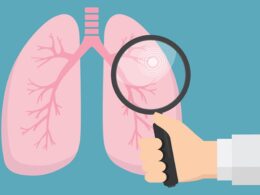Although, the total number of those who have started cancer treatment in England since the start of the pandemic is still more than 30,000 lower than expected.
This is a republication of the article “Hospitals told to slash waits as GP cancer referral rates spike”, with the title above, highlighting the message in question.
Pulse Today
Emma WilkinsonCostanza Potter
16 August 2022
Hospitals have been ordered to reduce the number of patients waiting too long for cancer investigation amid GP referral rates that are currently one fifth higher than before the pandemic.
In a letter to trusts and ICBs, sent at the end of last month, NHS England said cancer referrals ‘now constitute one in every four’ GP referrals to an acute trust.
It went on to task hospitals with cutting the number of patients waiting more than 62 days from urgent referral for suspected cancer to treatment to pre-pandemic levels.
But it said this will mean reducing the cancer waiting list by 14,000 patients by March next year.
The data stands in contrast to claims earlier this year that GPs were ‘fobbing off’ patients with cancer symptoms.
The letter said: ‘We need to reduce long-waiters at a time when referral levels for suspected cancer are as high as 120% of pre-pandemic levels and now constitute one in every four GP acute referrals’.
According to NHS England, 85% of those waiting more than 62 days to start treatment are being delayed by diagnostics and the focus should be on lower gastrointestinal, urology and skin pathways — which account for two-thirds of the backlog.
The next phase of the elective recovery plan will also focus on patients waiting longer than 78 weeks for care.
The letter said: ‘We know that solving this challenge, given the high volume of new patients, will involve carving out recurrent additional diagnostic and treatment capacity.
‘Whilst progress in reducing the backlog has understandably been challenging in the context of wider pressures, this now needs to be seen as a critical priority for the remainder of the year.
In a statement published this week, NHS England added: ‘Thanks to NHS campaigns and early diagnosis initiatives, suspected cancer referrals have remained at record levels over the last 16 months, reaching 121% of pre-pandemic levels in the month of May 2022.’
NHS England also announced this week that bowel cancer referrals have hit a ‘record’ high, with more than 170,500 people referred for checks for suspected lower gastro-intestinal cancers between May and July.
This is up by more than 30,000 compared to the same period last year and nearly 80,000 higher than two years ago, it said.
‘Referrals for bowel cancer hit an all-time high in the second week of July, up 60% on pre-pandemic levels’, it added.

But official data for June shows that only 60% of patients referred by their GP for suspected cancer are starting treatment within two months.
This is a ‘new worst on record’ for the target, which aims to have 85% of people starting treatment for cancer within 62 days of an urgent referral from their GP, Macmillan Cancer Support said.
This is a ‘new worst on record’ for the target, which aims to have 85% of people starting treatment for cancer within 62 days of an urgent referral from their GP, …
According to an analysis by Macmillan, the total number of those who have started cancer treatment in England since the start of the pandemic is still more than 30,000 lower than expected.
… the total number of those who have started cancer treatment in England since the start of the pandemic is still more than 30,000 lower than expected.
It said this figure ‘has barely changed for months, suggesting little progress is being made in catching up with missing treatments’.
Professor Azeem Majeed, professor of primary care and public health at Imperial College London, told Pulse that the NHS England statistics ‘show the importance of looking at the whole care pathway’.
… the NHS England statistics ‘show the importance of looking at the whole care pathway’.
He said: ‘A lot of the focus in the past has been on GP referrals. But GPs now find themselves referring patients but with the NHS not meeting targets for starting treatment for many patients.
‘Some of the delays are due to delays in getting diagnostic tests and this needs to be addressed in addition to the other part of the care pathway such as GP referrals, outpatient appointments, and treatment (e.g. chemotherapy, radiotherapy, surgery).’
‘Some of the delays are due to delays in getting diagnostic tests and this needs to be addressed in addition to the other part of the care pathway such as GP referrals, outpatient appointments, and treatment (e.g. chemotherapy, radiotherapy, surgery).’
RCGP vice chair Dr Gary Howsam said: ‘There was a drop in cancer referrals by GPs at the start of the pandemic, which research shows was mainly due to people following official guidance to stay at home, but referral rates are now consistently exceeding pre-pandemic levels.’
He added: ‘Against a backdrop of increasing workload and falling GP numbers, overall referrals by GPs through rapid suspected cancer pathways are 20% higher than pre-pandemic levels.
‘
What’s more, more than 75% of patients who are found to have cancer are being referred after just one or two consultations, showing that GPs are doing a good job at identifying suspected cancers and referring appropriately.’
Dr Howsam added that the Government must act ‘urgently’ to provide GP practice teams with ‘the necessary resources to improve the early detection of cancer, including a sufficient workforce and better access to diagnostic testing in the community’.
The RCGP has also warned that tackling the backlog of care is ‘vital’ to alleviate pressures in general practice, which has been left to ‘pick up the pieces’ while patients remain on the waiting list or need to be re-referred, at a time it is ‘already stretched beyond endurance’.
It comes as figures show the number of people waiting for more than two years for elective care — the focus in the first phase of the elective recovery plan — fell from 22,500 at the start of the year to fewer than 200.
But the latest figures show the overall waiting list has grown again to 6.8 million people.
In setting out its elective recovery plan, NHS England said the increase in elective activity would predominantly be achieved through increased GP advice and guidance (A&G).
The plans were first revealed in draft guidance seen by Pulse in March, which set out that GP A&G ‘could contribute an estimated six percentage points’ towards the target of ‘over 10% more’ activity.
Meanwhile, NHS England has warned that plans to invest in cancer services and community diagnostics, as well as in primary care, could be impacted by the NHS having to find funding for staff pay rises.
Originally published at https://www.pulsetoday.co.uk on August 16, 2022.
Names mentioned
Professor Azeem Majeed, professor of primary care and public health at Imperial College London












